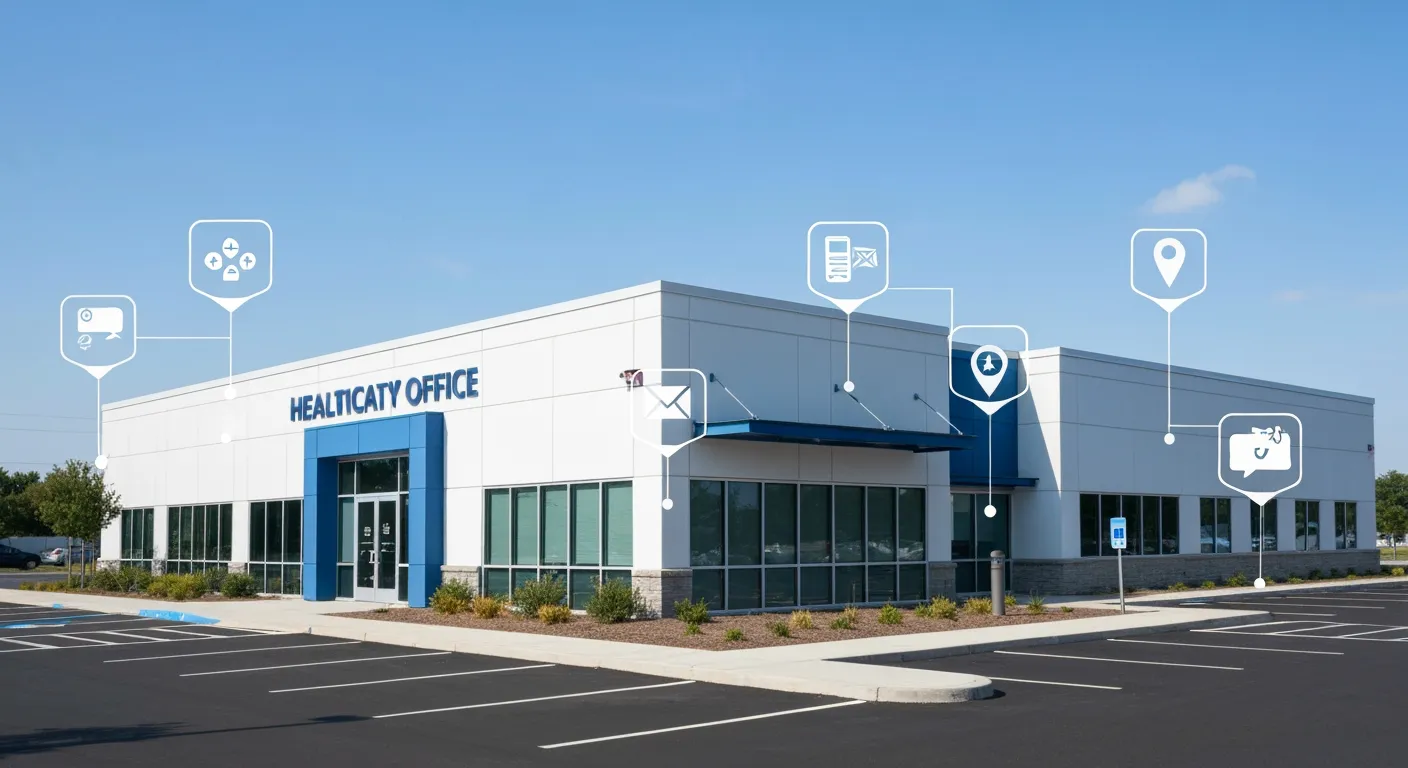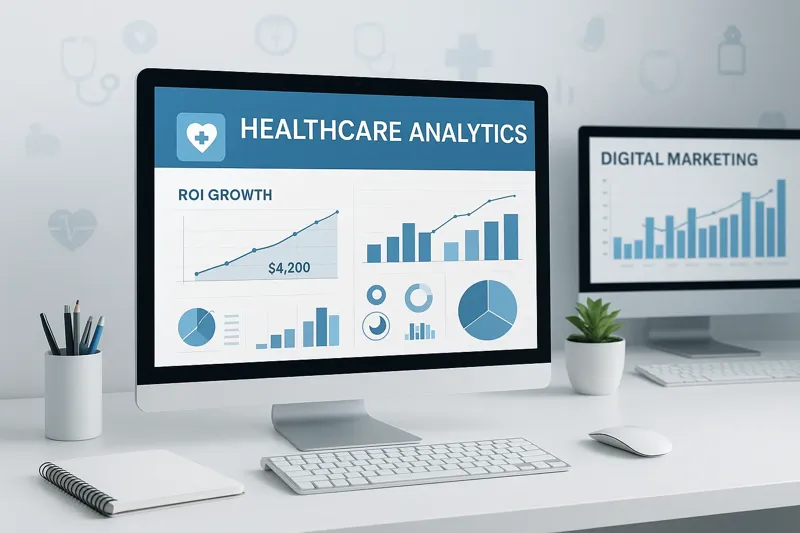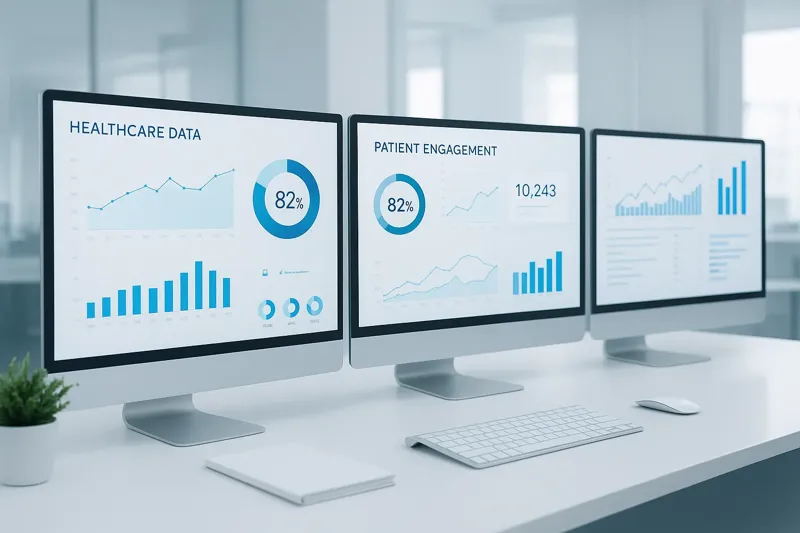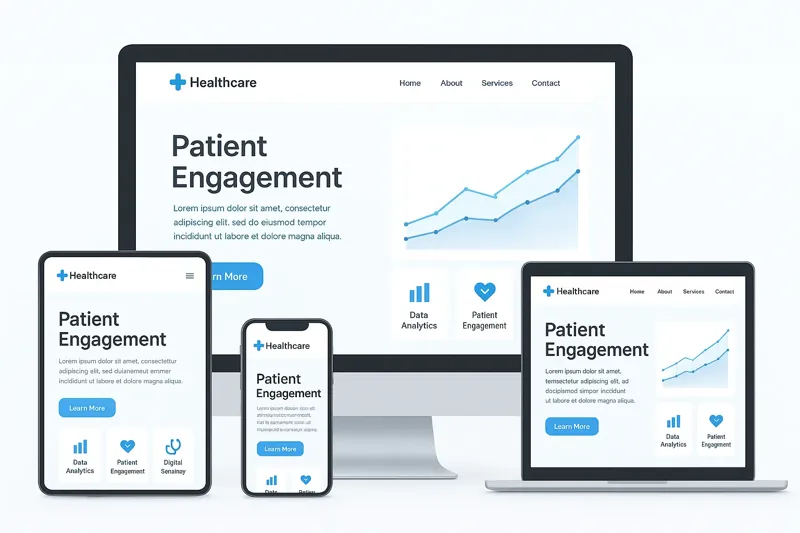Harnessing Digital Power for Healthcare Patient Acquisition
In an increasingly digital world, healthcare providers must adapt to meet patients where they are—online. With over one billion health-related searches conducted daily on Google alone, pay-per-click (PPC) advertising has become essential for medical practices aiming to attract high-value patients efficiently. This article explores comprehensive strategies to leverage Google Ads and PPC campaigns effectively while maintaining strict compliance with healthcare regulations like HIPAA. From campaign structuring and keyword optimization to compelling ad copy, landing page design, and ongoing management, healthcare providers can turn digital advertising into a powerful tool for patient acquisition and retention.
The Critical Role of Google Ads in Healthcare Marketing
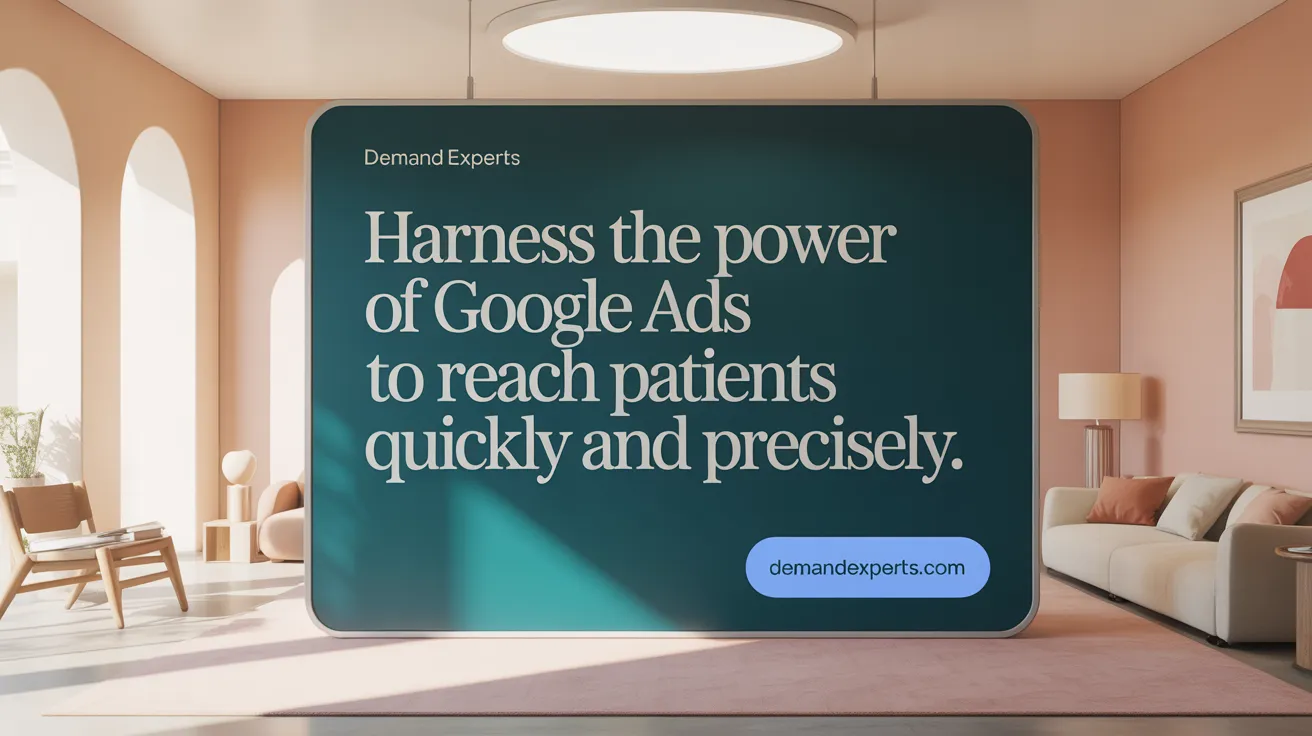
Why is Google Ads essential for healthcare providers in today's digital landscape?
Patients increasingly turn to digital platforms to find healthcare providers. Google dominates as the primary search engine, handling over 1 billion health-related searches each day—amounting to about 7% of all daily searches. This volume highlights the vast audience actively seeking medical services online.
Google Ads offers healthcare practices immediate visibility by prominently displaying ads at the top of search results. Unlike SEO, which may take months to yield significant traffic, Google Ads can deliver qualified leads within days. This fast, targeted exposure is crucial for connecting with high-intent patients actively searching for specific healthcare services.
Local targeting plays a pivotal role in healthcare PPC campaigns. Because most healthcare providers serve defined geographic areas, Google Ads’ geo-targeting features enable advertisers to deliver ads tailored to local patient populations. This precision reduces wasted spend by focusing on users likely to visit the practice, increasing appointment bookings and patient acquisitions.
In summary, Google Ads is essential for healthcare providers today because it leverages the massive volume of online health searches to quickly and efficiently connect providers with patients. Its ability to deliver immediate results and pinpoint local audiences makes it a foundational tool in modern healthcare marketing strategies.
Navigating Compliance: Healthcare Advertising Policies and HIPAA
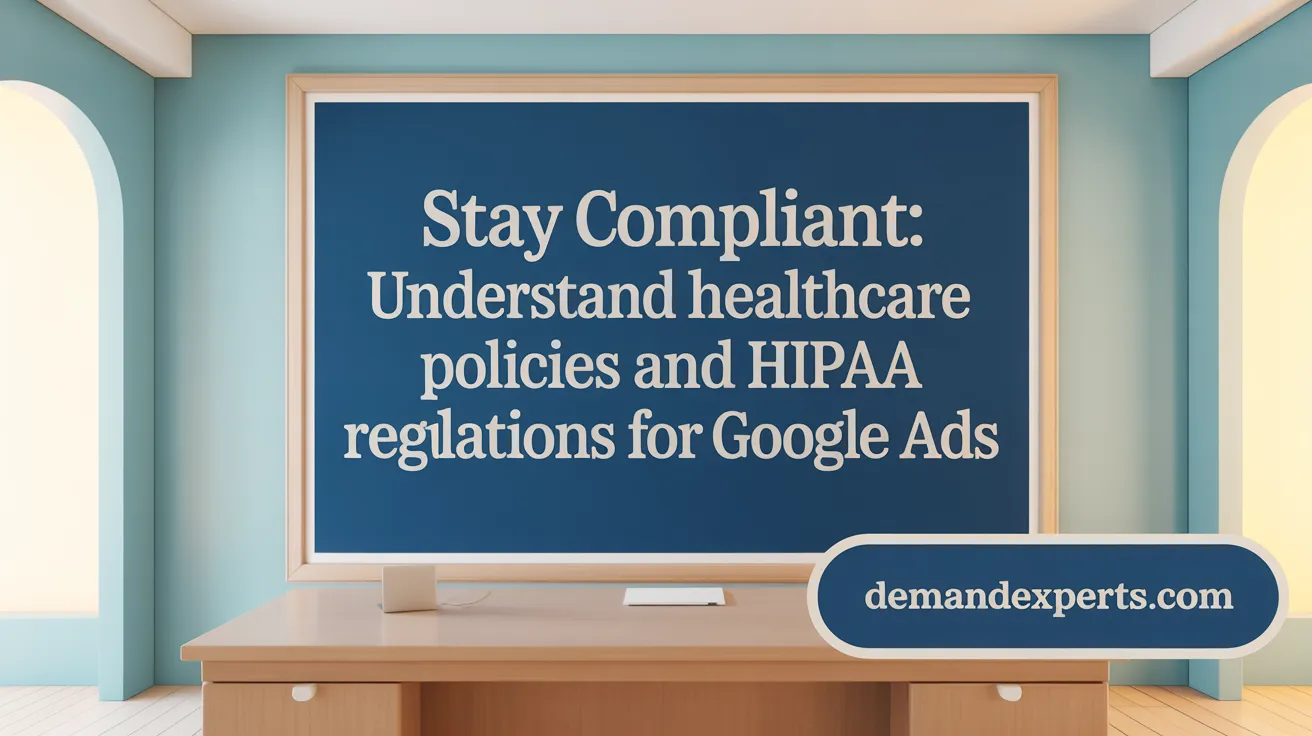
What compliance considerations must healthcare providers keep in mind when running Google Ads?
Healthcare advertising on Google Ads involves stringent compliance measures to meet both platform policies and legal regulations. Providers must obtain certifications such as LegitScript certification for pharmacies when advertising specific services like online pharmacies or telemedicine, ensuring that their ads meet Google healthcare advertising policies and Google’s healthcare advertising policies.
Strict restrictions apply to advertisement content relating to prescription drugs. Google limits the use of prescription drug terms in ad copy and keywords and prohibits promoting unapproved or experimental medical treatments, including regenerative medicine and stem cell therapies. For detailed information, see Healthcare advertising campaigns and prescription drug restrictions and Advertising rules for medicines.
HIPAA compliance is a fundamental requirement in healthcare PPC campaigns. Advertisers must avoid placing any Protected Health Information (PHI) in ads, landing pages, URLs, or lead capture forms. This also extends to the use of tracking and analytics tools — only HIPAA-compliant solutions should be employed to safeguard patient privacy and avoid potential legal consequences. Refer also to Healthcare PPC compliance tips.
Careful management of digital communication and data collection ensures that campaigns respect patient confidentiality. This includes eliminating remarketing to personal health conditions that could identify individuals or reveal sensitive information. Meeting these healthcare PPC compliance tips protects both the healthcare provider and patients while maintaining the integrity and trustworthiness of healthcare advertising efforts.
Building a Strong Digital Presence Prior to PPC Campaigns
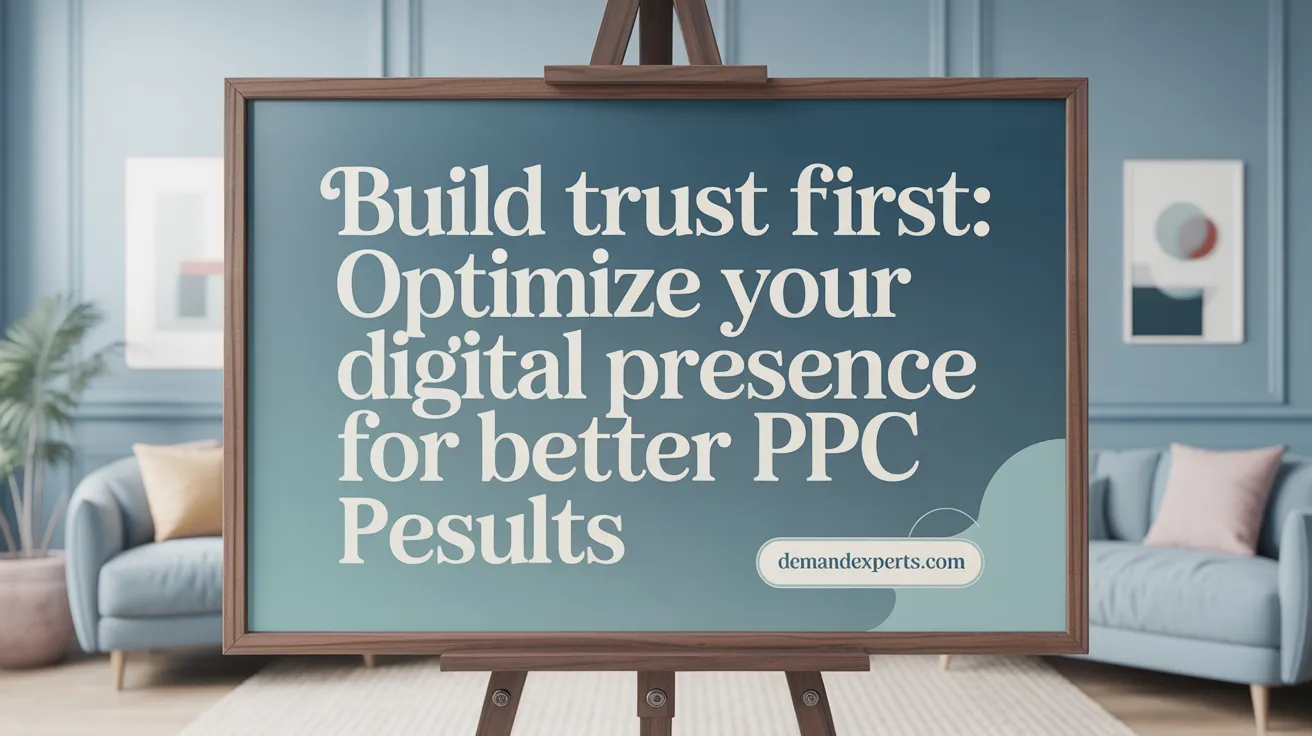
How important is digital presence optimization before starting healthcare PPC campaigns?
Optimizing digital presence is a foundational step critical to the success of healthcare PPC campaigns. A well-crafted, professional, and user-friendly website not only builds trust with prospective patients but also dramatically improves conversion rates once ads drive traffic.
Optimizing online reputation
Managing online reputation is essential. Positive patient reviews and a strong presence on digital platforms help establish credibility. This ensures that potential patients feel confident choosing your practice after clicking an ad.
Ensuring informative, trustworthy, and user-friendly websites
Your website needs to provide clear, accurate, and accessible information about services. It should convey professionalism and trustworthiness through design and content, catering to patient needs and search intent. Refer to best practices in creating effective healthcare landing pages.
Mobile responsiveness and easy patient intake processes
Given the rise of mobile health searches, mobile responsiveness is crucial. The website must load quickly and display correctly on smartphones. Additionally, streamlined online intake forms and easy-to-navigate appointment booking reduce friction, increasing conversion of visitors into patients.
Importance of prompt responses to digital inquiries
Quick and compassionate replies to digital inquiries are vital. Many leads fail to convert simply because of slow or no response. Efficient communication ensures a smooth transition from interest to appointment, maximizing the return on healthcare PPC advertising spend.
Keyword Research and Campaign Structuring for Healthcare PPC
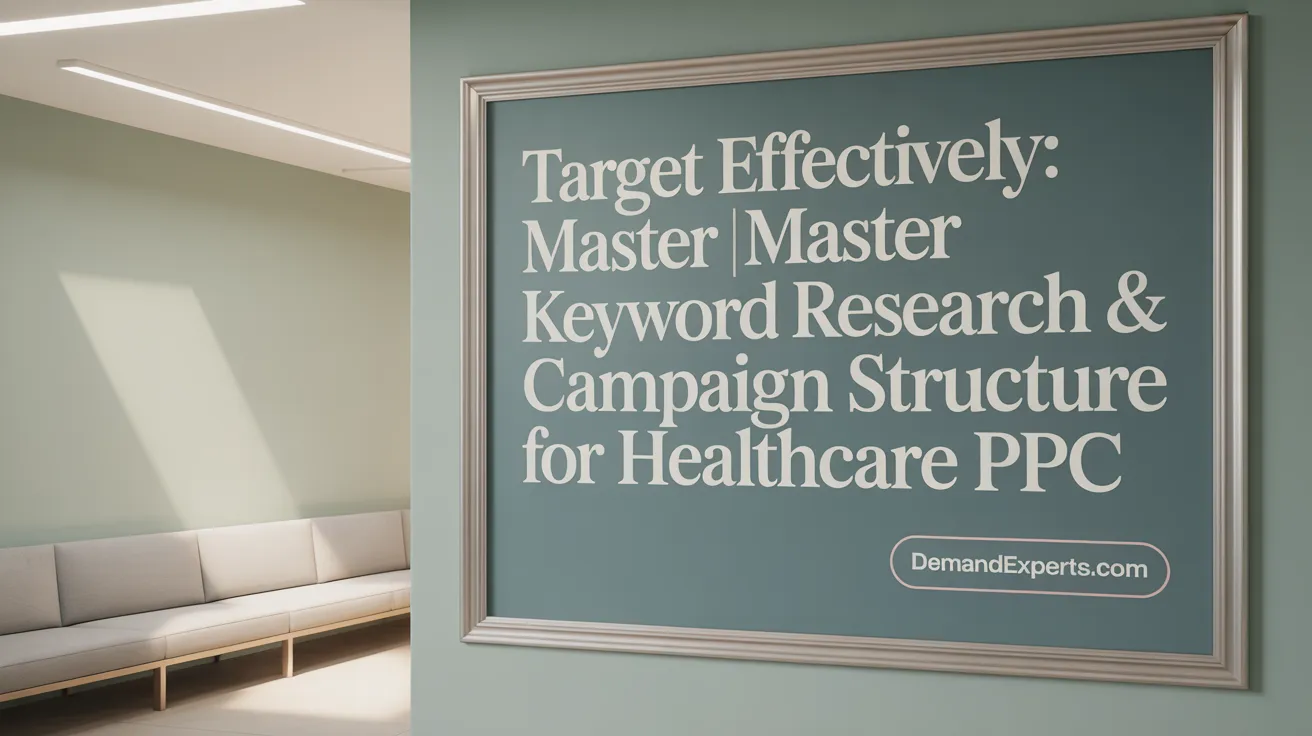
What strategies are effective for keyword research and organizing healthcare Google Ads campaigns?
Effective healthcare PPC campaigns begin with targeted keyword research focusing on condition-specific, procedure-specific, and location-based terms. These keywords reflect what prospective patients actively search for, capturing transactional intent and ensuring ads appear for highly relevant queries. For example, instead of broad terms like "pain treatment," focusing on "plantar fasciitis treatment in Chicago" narrows the audience and increases quality leads.
Campaigns should be structured into tightly focused ad groups based on specific services, medical conditions, or patient segments. This organization allows crafting customized ad copy tailored to each group, enhancing ad relevance and improving Quality Score, which can reduce costs and improve visibility. See more on healthcare PPC campaign structure.
Choosing the right keyword match types is essential. Phrase and exact match types limit ads to more precise searches, minimizing wasted spend on irrelevant clicks. Broad match keywords often lead to lower relevance and cost inefficiency unless paired with well-managed negative keyword lists. For additional insights, explore Google Ads strategies for healthcare providers.
Negative keywords are crucial in healthcare PPC to exclude unrelated or non-converting search terms, preserving budget and improving campaign ROI. For example, excluding terms like "free" or unrelated medical conditions ensures the ads only attract genuinely interested patients. Guidance on negative keyword management in healthcare PPC is highly beneficial.
Overall, combining focused keyword targeting with strong campaign structuring maximizes ad relevance, efficiency, and conversion potential for healthcare practices. For a comprehensive overview, see this healthcare PPC marketing guide.
Crafting Compliant and Patient-Centered Ad Copy
How should healthcare ad copy be designed for effectiveness and compliance?
Healthcare ad copy must strike a careful balance between persuasion and regulatory compliance to be both effective and legally sound. It should directly address patient needs and pain points, highlighting clear benefits and solutions offered by the healthcare service. Including compelling calls-to-action (CTAs) like "Schedule a Consultation" or "Request a Free Assessment" guides potential patients toward the next steps.
Using multiple headlines and descriptions in responsive search ads allows Google Ads to test and display the most effective combinations, maximizing engagement and conversions. This dynamic setup helps tailor the ad to different search queries and user intents.
Ad extensions such as sitelinks (which offer additional navigational links), call extensions (allowing direct phone calls), and location extensions (showing practice addresses) enhance ad visibility and provide valuable information to users upfront. These extensions improve click-through rates and strengthen trust by making it easy for patients to connect.
Importantly, healthcare ads must avoid making unsubstantiated medical claims. Claims should be factual, verifiable, and compliant with Google healthcare advertising policies and healthcare regulations. Additionally, prohibiting the inclusion of Protected Health Information (PHI) in ad copy or URLs is critical to maintain HIPAA compliance and protect patient privacy.
Optimizing Landing Pages for Healthcare PPC Conversion
What are the best practices for healthcare landing pages supporting PPC campaigns?
A successful healthcare PPC campaign relies heavily on landing pages that resonate directly with the user's search intent. Each landing page must align closely with the ad content and keywords to ensure relevance and increase the likelihood of conversion. For detailed strategies, see this Healthcare PPC guide.
Alignment of landing page content with ad search intent
Tailoring landing pages to reflect specific patient queries or advertised services enables visitors to quickly find the information they are seeking. This reduces bounce rates and encourages engagement. Learn more about Optimizing healthcare PPC campaigns and Optimized Healthcare Landing Pages.
Inclusion of credentials, testimonials, and trust signals
Trust is paramount in healthcare. Incorporate provider credentials, patient testimonials, and social proof prominently on the page. Additionally, clear display of accepted insurance information and other transparency indicators reassures potential patients. For examples on using Healthcare testimonials and trust signals and building trust, visit Healthcare PPC marketing guide.
Mobile optimization and fast page loading
Given the significant volume of mobile healthcare searches, landing pages must be fully responsive, offering seamless user experience across devices. Fast loading speeds are critical to prevent user drop-off and to improve Quality Scores in Google Ads. See best practices for Mobile-friendly healthcare landing pages and Mobile optimization for healthcare ads.
Clear, easy-to-use contact options and calls to action
Include easily accessible contact methods such as click-to-call buttons, appointment request forms, and clear calls to action (CTAs). Simplified contact options reduce friction for potential patients reaching out. Explore Healthcare call tracking and attribution and Effective Lead Collection in Healthcare PPC.
Compliance with legal and privacy requirements
Landing pages should adhere to HIPAA and other relevant privacy regulations. This means encrypting patient data, using HIPAA-compliant forms, and ensuring privacy policies are clearly stated when collecting personal health information. For comprehensive guidelines, refer to HIPAA compliance in healthcare advertising and Healthcare PPC compliance tips.
With these best practices, healthcare providers can significantly enhance the effectiveness of their PPC campaigns, converting clicks into valuable patient appointments and building trust in a competitive digital marketplace. For broader insights, see Healthcare PPC marketing.
Advanced Targeting and Budget Management Strategies
How can healthcare providers optimize targeting and budgeting in Google Ads?
Healthcare providers can maximize the effectiveness of their Google Ads campaigns by strategically enhancing targeting and budget management. One fundamental tactic is geo-targeting, which allows ads to focus on patients who are within a specific geographic radius of the healthcare practice. Radius targeting narrows this focus even further, ensuring the advertisements reach only those most likely to visit, thus improving the relevance and efficiency of ad spend.
Demographic and behavioral audience refinements add another layer of precision. By analyzing data such as age, gender, and online behavior, healthcare providers can tailor their campaigns to resonate with the most relevant patient segments. This approach reduces wasted impressions and increases the likelihood of engagement.
In terms of bidding strategies, it's advisable to start with manual cost-per-click (CPC) bidding. Manual control helps manage budget during the early learning phase of a campaign. As more performance data accumulates, switching to automated bidding methods—such as Target Cost-Per-Acquisition (CPA) or Target Return on Ad Spend (ROAS)—can optimize conversions and improve return on investment.
Scheduling ads to run during optimal times, such as business hours or peak patient inquiry times, enhances visibility when potential patients are most likely to act. Additionally, adjusting bids seasonally—for example, increasing spend during flu season or allergy periods—can capture surges in patient demand.
Finally, budget allocation should be data-driven. Prioritizing funds for campaigns and ad groups that deliver the highest conversion rates and ROI ensures efficient use of marketing budgets rather than merely increasing overall spend. Regular analysis and adjustment sustain performance and adapt to evolving patient behaviors and market conditions.
Measuring Success: Tracking, Analytics, and Ongoing Optimization
What are key considerations for tracking and optimizing healthcare PPC campaigns?
Conversion tracking is fundamental in healthcare PPC guide to gauge the effectiveness of ads. Providers should track patient actions such as phone calls, form submissions, and appointment bookings to accurately measure the return on investment (ROI).
Utilizing Google Analytics alongside HIPAA compliance in healthcare PPC tracking tools is critical for maintaining patient privacy and data security. These platforms provide detailed insights while ensuring ads comply with Google’s healthcare advertising policies.
Regularly analyzing campaign data allows healthcare marketers to refine keywords, adjust bids, and remove ineffective search terms with negative keywords. This process prevents wasted ad spend and improves targeting efficiency.
A/B testing of different ad copy versions and landing page designs helps identify which messaging or layout drives better patient engagement and conversions.
Continuous monitoring and campaign refinement are essential in responding to changing patient behavior and competitive dynamics, ensuring sustained performance and maximizing ad spend effectiveness.
Utilizing Diverse PPC Ad Formats to Maximize Reach

What PPC ad formats should healthcare providers consider for comprehensive campaigns?
Healthcare providers aiming to maximize their digital reach should implement a variety of PPC ad formats, each targeting different stages of the patient journey.
Search Ads
These ads appear in search engine results for terms with high patient intent, such as "urgent care near me" or "plastic surgeon in Chicago." They efficiently capture users actively seeking healthcare services, making them critical for immediate patient acquisition. Learn more about Search Ads in Healthcare.
Display Ads
Using visual banners and graphics across the Google Display Network, display ads build brand awareness and can retarget visitors who previously engaged with the website. This keeps the healthcare practice top of mind throughout the patient decision process. For insights, see Display Ads for Healthcare.
Local Service Ads (LSAs)
LSAs occupy prime positions in search results and feature a trusted ‘Google Guaranteed’ badge, increasing credibility. Operating on a pay-per-lead basis, they enable practices to attract highly qualified local prospects. Explore details at Local Service Ads for Healthcare.
Video Ads
Platforms like YouTube allow healthcare providers to share testimonials, service overviews, and patient stories in an engaging format, enhancing emotional connection and trust. Read more about Video Ads on YouTube for Medical Services.
Call-Only Ads
Optimized for mobile users, these ads encourage immediate phone calls, ideal for urgent or same-day appointment needs, streamlining patient contact. Understand more from Call-Only Ads for Healthcare.
Social Media Ads
Complementing Google Ads, social media platforms such as Facebook and Instagram enable targeted storytelling and educational content delivery. These ads foster long-term awareness, community engagement, and trust-building. See Social Media Ads for Healthcare Providers.
By integrating these diverse PPC formats, healthcare providers can effectively capture high-intent patients, increase brand visibility, and nurture relationships across multiple digital touchpoints. For a broader understanding of healthcare PPC marketing strategies, consult this Healthcare PPC marketing guide.
Partnering with Healthcare-Focused PPC Agencies for Success
Why is partnering with a healthcare specialized PPC agency advantageous?
Partnering with Healthcare-focused PPC agencies provides critical expertise in navigating the complex regulatory landscape that governs healthcare advertising. These agencies understand compliance requirements such as HIPAA compliance in advertising and Google’s healthcare advertising policies, which helps prevent potential campaign shutdowns or legal complications.
Such agencies design data-driven, ROI-focused campaigns that carefully target high-intent patient audiences and optimize ad budgets for maximum impact. Their approach often integrates PPC with complementary online marketing services like SEO, reputation management, and content marketing, creating a full-funnel patient acquisition strategy as detailed in PPC campaigns for healthcare.
Healthcare-specialized agencies are adept at avoiding common industry pitfalls, including inadequate targeting, poor keyword selection, and non-compliance issues. They structure campaigns with transparency and continuous optimization in mind, ensuring alignment with the healthcare provider's goals, as discussed in Healthcare PPC campaign structure.
Moreover, these agencies bring experience managing sensitive healthcare data while adhering to privacy laws. This combination of compliance expertise, strategic insight, and technical skills results in sustainable growth. For more on these competencies, see Healthcare PPC best practices.
Benefits of full-funnel campaign management and transparency
Healthcare-focused PPC agencies excel by managing every stage of the campaign funnel. From granular Keyword Research and Competitor Analysis for Healthcare and compelling compliant effective healthcare PPC ad copy to optimized Mobile-Optimized Landing Pages and Conversion tracking in healthcare ads, their approach drives patient engagement effectively.
Transparency is a vital benefit: agencies provide clear reporting on key performance indicators (KPIs) like click-through rates, conversion rates, cost-per-acquisition, and ROI. This openness helps healthcare providers make informed decisions and justify marketing investments, as emphasized in Healthcare PPC marketing guide.
In summary, partnering with a healthcare-specialized PPC agency ensures expertly crafted campaigns tailored to the unique needs and regulations of the healthcare sector, maximizing patient acquisition while maintaining full compliance. For examples of top agencies, see Best PPC agencies for healthcare 2025.
Optimizing Healthcare PPC: A Continuous Journey to Patient Growth
Effective Google Ads and PPC campaigns offer healthcare providers a dynamic way to attract and retain high-value patients through tailored targeting, compelling messages, and measurable results. Success depends on a solid foundation of regulatory compliance, strategic keyword and budget management, user-friendly landing pages, and continual optimization supported by robust tracking and analytics. Employing diverse ad formats enhances patient engagement across their decision-making journey, while partnering with healthcare-focused agencies provides the expertise needed to navigate regulatory complexities and maximize return on investment. By embracing a holistic and disciplined approach, healthcare providers can leverage PPC as a powerful engine for sustainable patient acquisition and practice growth.
Harnessing Digital Power for Healthcare Patient Acquisition
In an increasingly digital world, healthcare providers must adapt to meet patients where they are—online. With over one billion health-related searches conducted daily on Google alone, pay-per-click (PPC) advertising has become essential for medical practices aiming to attract high-value patients efficiently. This article explores comprehensive strategies to leverage Google Ads and PPC campaigns effectively while maintaining strict compliance with healthcare regulations like HIPAA. From campaign structuring and keyword optimization to compelling ad copy, landing page design, and ongoing management, healthcare providers can turn digital advertising into a powerful tool for patient acquisition and retention.
The Critical Role of Google Ads in Healthcare Marketing

Why is Google Ads essential for healthcare providers in today's digital landscape?
Patients increasingly turn to digital platforms to find healthcare providers. Google dominates as the primary search engine, handling over 1 billion health-related searches each day—amounting to about 7% of all daily searches. This volume highlights the vast audience actively seeking medical services online.
Google Ads offers healthcare practices immediate visibility by prominently displaying ads at the top of search results. Unlike SEO, which may take months to yield significant traffic, Google Ads can deliver qualified leads within days. This fast, targeted exposure is crucial for connecting with high-intent patients actively searching for specific healthcare services.
Local targeting plays a pivotal role in healthcare PPC campaigns. Because most healthcare providers serve defined geographic areas, Google Ads’ geo-targeting features enable advertisers to deliver ads tailored to local patient populations. This precision reduces wasted spend by focusing on users likely to visit the practice, increasing appointment bookings and patient acquisitions.
In summary, Google Ads is essential for healthcare providers today because it leverages the massive volume of online health searches to quickly and efficiently connect providers with patients. Its ability to deliver immediate results and pinpoint local audiences makes it a foundational tool in modern healthcare marketing strategies.
Navigating Compliance: Healthcare Advertising Policies and HIPAA

What compliance considerations must healthcare providers keep in mind when running Google Ads?
Healthcare advertising on Google Ads involves stringent compliance measures to meet both platform policies and legal regulations. Providers must obtain certifications such as LegitScript certification for pharmacies when advertising specific services like online pharmacies or telemedicine, ensuring that their ads meet Google healthcare advertising policies and Google’s healthcare advertising policies.
Strict restrictions apply to advertisement content relating to prescription drugs. Google limits the use of prescription drug terms in ad copy and keywords and prohibits promoting unapproved or experimental medical treatments, including regenerative medicine and stem cell therapies. For detailed information, see Healthcare advertising campaigns and prescription drug restrictions and Advertising rules for medicines.
HIPAA compliance is a fundamental requirement in healthcare PPC campaigns. Advertisers must avoid placing any Protected Health Information (PHI) in ads, landing pages, URLs, or lead capture forms. This also extends to the use of tracking and analytics tools — only HIPAA-compliant solutions should be employed to safeguard patient privacy and avoid potential legal consequences. Refer also to Healthcare PPC compliance tips.
Careful management of digital communication and data collection ensures that campaigns respect patient confidentiality. This includes eliminating remarketing to personal health conditions that could identify individuals or reveal sensitive information. Meeting these healthcare PPC compliance tips protects both the healthcare provider and patients while maintaining the integrity and trustworthiness of healthcare advertising efforts.
Building a Strong Digital Presence Prior to PPC Campaigns

How important is digital presence optimization before starting healthcare PPC campaigns?
Optimizing digital presence is a foundational step critical to the success of healthcare PPC campaigns. A well-crafted, professional, and user-friendly website not only builds trust with prospective patients but also dramatically improves conversion rates once ads drive traffic.
Optimizing online reputation
Managing online reputation is essential. Positive patient reviews and a strong presence on digital platforms help establish credibility. This ensures that potential patients feel confident choosing your practice after clicking an ad.
Ensuring informative, trustworthy, and user-friendly websites
Your website needs to provide clear, accurate, and accessible information about services. It should convey professionalism and trustworthiness through design and content, catering to patient needs and search intent. Refer to best practices in creating effective healthcare landing pages.
Mobile responsiveness and easy patient intake processes
Given the rise of mobile health searches, mobile responsiveness is crucial. The website must load quickly and display correctly on smartphones. Additionally, streamlined online intake forms and easy-to-navigate appointment booking reduce friction, increasing conversion of visitors into patients.
Importance of prompt responses to digital inquiries
Quick and compassionate replies to digital inquiries are vital. Many leads fail to convert simply because of slow or no response. Efficient communication ensures a smooth transition from interest to appointment, maximizing the return on healthcare PPC advertising spend.
Keyword Research and Campaign Structuring for Healthcare PPC

What strategies are effective for keyword research and organizing healthcare Google Ads campaigns?
Effective healthcare PPC campaigns begin with targeted keyword research focusing on condition-specific, procedure-specific, and location-based terms. These keywords reflect what prospective patients actively search for, capturing transactional intent and ensuring ads appear for highly relevant queries. For example, instead of broad terms like "pain treatment," focusing on "plantar fasciitis treatment in Chicago" narrows the audience and increases quality leads.
Campaigns should be structured into tightly focused ad groups based on specific services, medical conditions, or patient segments. This organization allows crafting customized ad copy tailored to each group, enhancing ad relevance and improving Quality Score, which can reduce costs and improve visibility. See more on healthcare PPC campaign structure.
Choosing the right keyword match types is essential. Phrase and exact match types limit ads to more precise searches, minimizing wasted spend on irrelevant clicks. Broad match keywords often lead to lower relevance and cost inefficiency unless paired with well-managed negative keyword lists. For additional insights, explore Google Ads strategies for healthcare providers.
Negative keywords are crucial in healthcare PPC to exclude unrelated or non-converting search terms, preserving budget and improving campaign ROI. For example, excluding terms like "free" or unrelated medical conditions ensures the ads only attract genuinely interested patients. Guidance on negative keyword management in healthcare PPC is highly beneficial.
Overall, combining focused keyword targeting with strong campaign structuring maximizes ad relevance, efficiency, and conversion potential for healthcare practices. For a comprehensive overview, see this healthcare PPC marketing guide.
Crafting Compliant and Patient-Centered Ad Copy
How should healthcare ad copy be designed for effectiveness and compliance?
Healthcare ad copy must strike a careful balance between persuasion and regulatory compliance to be both effective and legally sound. It should directly address patient needs and pain points, highlighting clear benefits and solutions offered by the healthcare service. Including compelling calls-to-action (CTAs) like "Schedule a Consultation" or "Request a Free Assessment" guides potential patients toward the next steps.
Using multiple headlines and descriptions in responsive search ads allows Google Ads to test and display the most effective combinations, maximizing engagement and conversions. This dynamic setup helps tailor the ad to different search queries and user intents.
Ad extensions such as sitelinks (which offer additional navigational links), call extensions (allowing direct phone calls), and location extensions (showing practice addresses) enhance ad visibility and provide valuable information to users upfront. These extensions improve click-through rates and strengthen trust by making it easy for patients to connect.
Importantly, healthcare ads must avoid making unsubstantiated medical claims. Claims should be factual, verifiable, and compliant with Google healthcare advertising policies and healthcare regulations. Additionally, prohibiting the inclusion of Protected Health Information (PHI) in ad copy or URLs is critical to maintain HIPAA compliance and protect patient privacy.
Optimizing Landing Pages for Healthcare PPC Conversion
What are the best practices for healthcare landing pages supporting PPC campaigns?
A successful healthcare PPC campaign relies heavily on landing pages that resonate directly with the user's search intent. Each landing page must align closely with the ad content and keywords to ensure relevance and increase the likelihood of conversion. For detailed strategies, see this Healthcare PPC guide.
Alignment of landing page content with ad search intent
Tailoring landing pages to reflect specific patient queries or advertised services enables visitors to quickly find the information they are seeking. This reduces bounce rates and encourages engagement. Learn more about Optimizing healthcare PPC campaigns and Optimized Healthcare Landing Pages.
Inclusion of credentials, testimonials, and trust signals
Trust is paramount in healthcare. Incorporate provider credentials, patient testimonials, and social proof prominently on the page. Additionally, clear display of accepted insurance information and other transparency indicators reassures potential patients. For examples on using Healthcare testimonials and trust signals and building trust, visit Healthcare PPC marketing guide.
Mobile optimization and fast page loading
Given the significant volume of mobile healthcare searches, landing pages must be fully responsive, offering seamless user experience across devices. Fast loading speeds are critical to prevent user drop-off and to improve Quality Scores in Google Ads. See best practices for Mobile-friendly healthcare landing pages and Mobile optimization for healthcare ads.
Clear, easy-to-use contact options and calls to action
Include easily accessible contact methods such as click-to-call buttons, appointment request forms, and clear calls to action (CTAs). Simplified contact options reduce friction for potential patients reaching out. Explore Healthcare call tracking and attribution and Effective Lead Collection in Healthcare PPC.
Compliance with legal and privacy requirements
Landing pages should adhere to HIPAA and other relevant privacy regulations. This means encrypting patient data, using HIPAA-compliant forms, and ensuring privacy policies are clearly stated when collecting personal health information. For comprehensive guidelines, refer to HIPAA compliance in healthcare advertising and Healthcare PPC compliance tips.
With these best practices, healthcare providers can significantly enhance the effectiveness of their PPC campaigns, converting clicks into valuable patient appointments and building trust in a competitive digital marketplace. For broader insights, see Healthcare PPC marketing.
Advanced Targeting and Budget Management Strategies
How can healthcare providers optimize targeting and budgeting in Google Ads?
Healthcare providers can maximize the effectiveness of their Google Ads campaigns by strategically enhancing targeting and budget management. One fundamental tactic is geo-targeting, which allows ads to focus on patients who are within a specific geographic radius of the healthcare practice. Radius targeting narrows this focus even further, ensuring the advertisements reach only those most likely to visit, thus improving the relevance and efficiency of ad spend.
Demographic and behavioral audience refinements add another layer of precision. By analyzing data such as age, gender, and online behavior, healthcare providers can tailor their campaigns to resonate with the most relevant patient segments. This approach reduces wasted impressions and increases the likelihood of engagement.
In terms of bidding strategies, it's advisable to start with manual cost-per-click (CPC) bidding. Manual control helps manage budget during the early learning phase of a campaign. As more performance data accumulates, switching to automated bidding methods—such as Target Cost-Per-Acquisition (CPA) or Target Return on Ad Spend (ROAS)—can optimize conversions and improve return on investment.
Scheduling ads to run during optimal times, such as business hours or peak patient inquiry times, enhances visibility when potential patients are most likely to act. Additionally, adjusting bids seasonally—for example, increasing spend during flu season or allergy periods—can capture surges in patient demand.
Finally, budget allocation should be data-driven. Prioritizing funds for campaigns and ad groups that deliver the highest conversion rates and ROI ensures efficient use of marketing budgets rather than merely increasing overall spend. Regular analysis and adjustment sustain performance and adapt to evolving patient behaviors and market conditions.
Measuring Success: Tracking, Analytics, and Ongoing Optimization
What are key considerations for tracking and optimizing healthcare PPC campaigns?
Conversion tracking is fundamental in healthcare PPC guide to gauge the effectiveness of ads. Providers should track patient actions such as phone calls, form submissions, and appointment bookings to accurately measure the return on investment (ROI).
Utilizing Google Analytics alongside HIPAA compliance in healthcare PPC tracking tools is critical for maintaining patient privacy and data security. These platforms provide detailed insights while ensuring ads comply with Google’s healthcare advertising policies.
Regularly analyzing campaign data allows healthcare marketers to refine keywords, adjust bids, and remove ineffective search terms with negative keywords. This process prevents wasted ad spend and improves targeting efficiency.
A/B testing of different ad copy versions and landing page designs helps identify which messaging or layout drives better patient engagement and conversions.
Continuous monitoring and campaign refinement are essential in responding to changing patient behavior and competitive dynamics, ensuring sustained performance and maximizing ad spend effectiveness.
Utilizing Diverse PPC Ad Formats to Maximize Reach

What PPC ad formats should healthcare providers consider for comprehensive campaigns?
Healthcare providers aiming to maximize their digital reach should implement a variety of PPC ad formats, each targeting different stages of the patient journey.
Search Ads
These ads appear in search engine results for terms with high patient intent, such as "urgent care near me" or "plastic surgeon in Chicago." They efficiently capture users actively seeking healthcare services, making them critical for immediate patient acquisition. Learn more about Search Ads in Healthcare.
Display Ads
Using visual banners and graphics across the Google Display Network, display ads build brand awareness and can retarget visitors who previously engaged with the website. This keeps the healthcare practice top of mind throughout the patient decision process. For insights, see Display Ads for Healthcare.
Local Service Ads (LSAs)
LSAs occupy prime positions in search results and feature a trusted ‘Google Guaranteed’ badge, increasing credibility. Operating on a pay-per-lead basis, they enable practices to attract highly qualified local prospects. Explore details at Local Service Ads for Healthcare.
Video Ads
Platforms like YouTube allow healthcare providers to share testimonials, service overviews, and patient stories in an engaging format, enhancing emotional connection and trust. Read more about Video Ads on YouTube for Medical Services.
Call-Only Ads
Optimized for mobile users, these ads encourage immediate phone calls, ideal for urgent or same-day appointment needs, streamlining patient contact. Understand more from Call-Only Ads for Healthcare.
Social Media Ads
Complementing Google Ads, social media platforms such as Facebook and Instagram enable targeted storytelling and educational content delivery. These ads foster long-term awareness, community engagement, and trust-building. See Social Media Ads for Healthcare Providers.
By integrating these diverse PPC formats, healthcare providers can effectively capture high-intent patients, increase brand visibility, and nurture relationships across multiple digital touchpoints. For a broader understanding of healthcare PPC marketing strategies, consult this Healthcare PPC marketing guide.
Partnering with Healthcare-Focused PPC Agencies for Success
Why is partnering with a healthcare specialized PPC agency advantageous?
Partnering with Healthcare-focused PPC agencies provides critical expertise in navigating the complex regulatory landscape that governs healthcare advertising. These agencies understand compliance requirements such as HIPAA compliance in advertising and Google’s healthcare advertising policies, which helps prevent potential campaign shutdowns or legal complications.
Such agencies design data-driven, ROI-focused campaigns that carefully target high-intent patient audiences and optimize ad budgets for maximum impact. Their approach often integrates PPC with complementary online marketing services like SEO, reputation management, and content marketing, creating a full-funnel patient acquisition strategy as detailed in PPC campaigns for healthcare.
Healthcare-specialized agencies are adept at avoiding common industry pitfalls, including inadequate targeting, poor keyword selection, and non-compliance issues. They structure campaigns with transparency and continuous optimization in mind, ensuring alignment with the healthcare provider's goals, as discussed in Healthcare PPC campaign structure.
Moreover, these agencies bring experience managing sensitive healthcare data while adhering to privacy laws. This combination of compliance expertise, strategic insight, and technical skills results in sustainable growth. For more on these competencies, see Healthcare PPC best practices.
Benefits of full-funnel campaign management and transparency
Healthcare-focused PPC agencies excel by managing every stage of the campaign funnel. From granular Keyword Research and Competitor Analysis for Healthcare and compelling compliant effective healthcare PPC ad copy to optimized Mobile-Optimized Landing Pages and Conversion tracking in healthcare ads, their approach drives patient engagement effectively.
Transparency is a vital benefit: agencies provide clear reporting on key performance indicators (KPIs) like click-through rates, conversion rates, cost-per-acquisition, and ROI. This openness helps healthcare providers make informed decisions and justify marketing investments, as emphasized in Healthcare PPC marketing guide.
In summary, partnering with a healthcare-specialized PPC agency ensures expertly crafted campaigns tailored to the unique needs and regulations of the healthcare sector, maximizing patient acquisition while maintaining full compliance. For examples of top agencies, see Best PPC agencies for healthcare 2025.
Optimizing Healthcare PPC: A Continuous Journey to Patient Growth
Effective Google Ads and PPC campaigns offer healthcare providers a dynamic way to attract and retain high-value patients through tailored targeting, compelling messages, and measurable results. Success depends on a solid foundation of regulatory compliance, strategic keyword and budget management, user-friendly landing pages, and continual optimization supported by robust tracking and analytics. Employing diverse ad formats enhances patient engagement across their decision-making journey, while partnering with healthcare-focused agencies provides the expertise needed to navigate regulatory complexities and maximize return on investment. By embracing a holistic and disciplined approach, healthcare providers can leverage PPC as a powerful engine for sustainable patient acquisition and practice growth.


